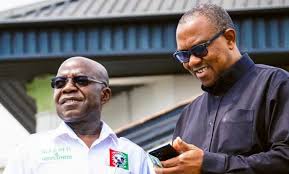Nigeria at 65: Tanko Yakassai on Regionalism, Democracy, and the Road Ahead
As Nigeria marked 65 years of independence, elder statesman Alhaji Tanko Yakasai (nearly 100 years old) reflects on regionalism, the state of democracy, insecurity, and the political dynamics shaping the nation. Below is a synthesis of his key perspectives, drawn from the interview transcript.
- Why Nigeria cannot return to regionalism
Yakassai argues that regional government is not feasible in today’s Nigeria. He points to historical attempts at regional arrangements, noting that the country has moved on and that a return to regionalism would be out of step with current realities. He emphasises the need to “move with the times progressively” and to recognise the country’s development trajectory since independence. - Democracy in Nigeria: functioning but not flawless
On whether Nigeria’s current democratic system works, Yakassai answers in the affirmative, acknowledging that no system is perfect but highlighting democracy’s participatory nature. He notes the ongoing process of electoral reforms and fine-tuning as evidence of a living, evolving democracy rather than a failed experiment. - The North’s voice and unity
Addressing the question of whether the North can speak with one voice, he asserts it’s improbable to expect uniformity given Nigeria’s size and diversity. He underscores that differences are natural in any large population and views such pluralism as a normal aspect of political life. - Insecurity, corruption, and the economy: a global challenge
Yakassai situates Nigeria’s security, corruption, and economic challenges within a worldwide context, arguing that many nations face similar problems. He remains hopeful about progress and stresses the importance of continuity in government to sustain policies that work. - Continuity in government
A recurring theme is the importance of continuity in leadership to preserve policies and momentum. He warns against abrupt changes that could reverse gains and calls for a coordinated approach across federal, state, and local levels. - Regional politics and zoning
He defends zoning as a principle designed to promote inclusivity and a sense of belonging across Nigeria’s diverse regions. He views zoning as a potential permanent feature that could contribute to national cohesion. - Tinubu’s presidency and 2027 elections
Yakassai suggests Tinubu is well-positioned to seek re-election due to incumbency, party control, and the political landscape, while noting that no single region can unilaterally decide the presidency. He emphasises that broad national support is essential for success. - Defections and party dynamics
He views defections as part of democratic development, driven by strategic calculations and party dynamics. He cautions politicians to pursue ideology and programmes over personal gain, advocating for a political culture that serves the country’s interests.
- “We must move with the times progressively. It is part of development.”
- “Democracy is working for Nigeria… the people who are being governed are allowed to elect those who govern them.”
- “There will be differences, it is in human nature. We have been experiencing it for a long time, and we will overcome it.”
- “Security has been a recurrent issue not only in Nigeria but across the globe. It is incumbent on every administration to work out strategies to deal with it.”
- “Zoning is something I hope will become a permanent feature for our country because of its obvious benefits for national growth and sense of inclusion.”
What this means for readers today
- For policymakers: The emphasis on continuity and gradual reform suggests that abrupt policy shifts can be destabilising. A cross-cutting, inclusive approach to governance—across federal, state, and local levels—may yield better security and development outcomes.
- For citizens: Understanding that regional differences are natural can foster more constructive national dialogue. Embracing inclusive policies like zoning could enhance national cohesion.
- For students and analysts: Yakassai’s perspective provides a historical lens on how Nigeria’s post-independence political architecture evolved and why certain constitutional options (like regionalism) are viewed as impractical today.
A closer look at the interview highlights
- 65 years of independence: Yakassai touts steady progress since independence, with particular attention to enduring the turbulent post-independence era, including the civil conflict, and maintaining Nigeria’s unity.
- Regionalism: He explicitly states that regional government is not feasible anymore and warns against attempts to revive it.
- Democracy and reforms: He frames democracy as robust and adaptable, with ongoing electoral reforms to address imperfections.
- North’s representation: He acknowledges diverse opinions within the North, reflecting the broader reality of Nigeria’s political landscape.
- Security and national governance: He advocates for cooperation across all tiers of government and civil society to combat insecurity effectively.
Tanko Yakassai’s reflections underscore a pragmatic approach to Nigeria’s future: preserve inclusive, democratic governance; avoid regressive regionalism; maintain policy continuity; and pursue reforms that broaden participation and national cohesion. His insistence on unity through diversity—while recognising inevitable differences—offers a lens for navigating Nigeria’s ongoing journey toward development and stability.



